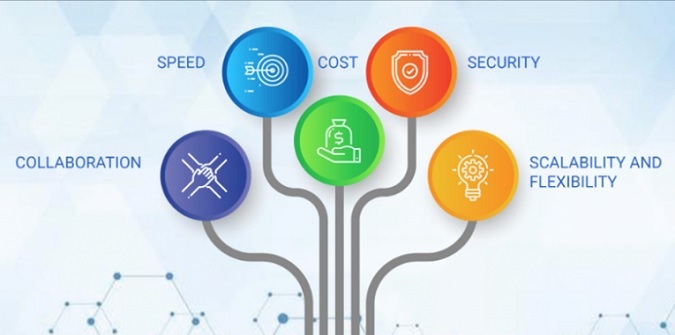In today's fast-paced environment, the Information Technology (IT) sector stands out as one of the…

Cloud Computing Challenges for Healthcare Providers in Australia
Cloud Computing has been proven to be revolutionary not only in the IT industry but also in the healthcare sector. It is clear that using cloud technology has become a trend that is continuously growing – and will long into the future. We have already discussed how cloud computing is transforming the healthcare industry and what are the benefits of cloud storage solutions.
You can also review a comprehensive guide on cloud computing security considerations published by the Australian Government. But before going into cloud computing challenges, let’s start with the basic definitions and general characteristics.
What is Cloud Computing?
Cloud computing in healthcare is the delivery of different software and hardware services digitally, through cloud servers. These servers are actively manage, and process data that allows users to develop or upgrade their healthcare IT infrastructure, share and access data from anywhere, and recover important data if any kind of disaster happens. In simple terms, the capabilities of the cloud are immense. There are three (3) most common types of cloud computing services including SaaS, IaaS, PaaS.
Software as a Service (SaaS) – software is owned, delivered, and managed remotely by the service provider.
Infrastructure as a Service (IaaS) – compute resources, completed by storage and networking capacities are owned and hosted by providers and available to customers on-demand.
Platform as a Service (PaaS) – the comprehensive collection of application infrastructure (middleware) services, including application platforms, integration, business process management, and database services.

Top 6 Cloud Computing Challenges and Risks
Before utilizing cloud computing technology for your practice, it is necessary for you to understand the challenges involved when migrating your healthcare business into the cloud. Cloud computing lesser administration by providing a flexible and different service that is scalable based on changing demand. Because of the cloud computing transformation, several healthcare organizations gravitate toward cloud solutions. With this, there are some cloud computing risks, and limitations.
Challenge 1: Data Security and Privacy
Data security is a major concern in cloud-based computing, as you are incapable to locate the exact location where your data is stored or being processed. Cloud computing risks can occur during the implementation or management process. The major concerns surrounding cyber dangers across the panel are:
- Compromised credentials
- Broken authentication
- Human blunder
- Sensitive data breaches
- Hacked interfaces and APIs
- Account hijacking
By keeping your fingers on the pulse of arising trends and understanding the cybersecurity abilities of every commodity within your ecosystem, you will decrease the threat of breaches or attacks greatly. Cloud computing risks have become a reality for every healthcare organization. It is essential to conduct cybersecurity risk assessments that can leverage proper security measures.
Challenge 2: Cost Management
Modern computing can save businesses’ expenses. In the cloud, a healthcare organization can easily ramp up its processing capacities without making large investments in new hardware. Hospitals can instead access additional processing through pay-as-you-go models from public providers. However, the on-demand and scalable nature of healthcare cloud computing services make it sometimes hard to explain and predict quantities and costs.
Challenge 3: Multi-Cloud Environments
Due to the high number of options available to healthcare organizations, hospitals not only use a single cloud but depend on multiple cloud service providers. Most hospitals employ hybrid cloud techniques and close to 84% rely on multiple clouds. This usually ends up being foiled and hard to manage for the infrastructure team. The process most of the time ends up being highly difficult for the IT team due to the differences between multiple cloud providers.
Challenge 4: Performance Challenges
Performance is an essential element when considering cloud-based solutions. If the cloud performance is not satisfactory, it can move away users and reduce profits. Even a little latency while loading an app or a web page can result in a big drop in the user’s percentage. This latency can be a product of inadequate load balancing, which indicates that the server cannot efficiently separate the incoming traffic to deliver the best user experience. Challenges also occur in the case of fault tolerance, which signifies the operations continue as needed even when one or more of the components fail.
Challenge 5: Interoperability and Flexibility
When a healthcare organization employs a particular cloud service provider and wants to switch to another cloud-based solution, it often turns up to be a tiresome procedure since applications written for one cloud with the application stack are needed to be rewritten for the other cloud. There is a deficiency of flexibility in changing from one cloud to another due to the complexities concerned. Handling data movement, and setting up the security from scratch and network also add up to the issues faced when changing cloud solutions, thereby lessening flexibility.
Challenge 6: Cloud Migration
One of the main cloud computing risks in recent years focuses on migration. This is the procedure of transferring an application to the cloud. Although moving a new application is a precise process, when it comes to moving an existing application to a new domain, many cloud difficulties arise. The most common problems are:
- Extensive troubleshooting
- Cybersecurity challenges
- Slow data migrations
- Migration agents
- Cutover complexity
- Application downtime
- Dependency mapping
- Assessing technical feasibility
- Understanding application dependencies
- Cost-optimization after migration
Take Your Healthcare Practice To The Next Level
It is no wonder that managed cloud services are revolutionizing the healthcare industry in Australia. As adoption exponentially increases, healthcare businesses of all sizes are getting the benefits of cloud storage solutions. To make the best out of this modern age of IT facilitation and overcome cloud computing challenges, you should take a strategic approach and choose Medical IT Services when it comes to implementing cloud-based solutions for your healthcare business. Contact us today to enhance the productivity of your healthcare practice through our one-hour free IT consulting with 24×7 technical support.
Related Articles:




